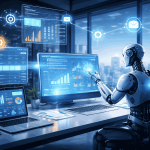
AI Workflow Development: A Step-by-Step Guide
AI helps automate and improve business tasks—but to use it well, you need a smart plan. That’s where AI Workflow Development comes in.
This guide walks you through building a working AI process—from defining the goal to deploying your model. Whether you’re in IT or a business team, you’ll learn everything you need to know.
Why AI Workflow Development Matters
Benefits of a Clear AI Workflow
A well-structured plan for the creation of AI workflows helps:
-
Reduce errors
-
Improve results
-
Save time and resources
-
Support long-term success
Without it, projects often stall due to confusion, poor planning, or weak execution.
Step 1: Define Your AI Project Goals
Start with a clear problem. Ask yourself:
-
What task will AI improve?
-
What does success look like?
-
What data do we need?
AI Workflow Development begins by matching technical work with business needs.
Step 2: Collect and Prepare the Right Data
Data is key to every AI project. In this stage of AI Workflow Development, make sure your data is:
-
Clean and labeled
-
From trusted sources
-
Aligned with your goal
Use tools like Google Cloud or Excel, and code libraries like Pandas or Scikit-learn.
Step 3: Choose the Best AI Model
The next part of AI Workflow Development is choosing your model. Pick based on the task:
-
Regression models for predictions
-
Classification models for decisions
-
NLP models for language tasks
Using cloud platforms or tools like OpenAI can speed things up.
Step 4: Train and Test the Model
Split your data into:
-
Training set (to learn)
-
Test set (to evaluate)
In AI Workflow Development, monitor these metrics:
-
Accuracy
-
Precision
-
Recall
This helps you check how well the AI is learning.
Step 5: Deploy Your AI Model
Once trained, deploy your model. Options include:
-
Docker for containers
-
AWS SageMaker for cloud deployment
-
CI/CD tools like Jenkins
Deployment in AI Workflow Development means making your model available in real-time.
Step 6: Monitor and Improve Performance
Even after launch, AI needs care. Keep monitoring performance through dashboards and logs. In your AI Workflow Development, make time for:
-
Regular updates
-
Model retraining
-
Error handling
Use tools like MLflow or TensorBoard for tracking.
Best Practices for Creation of AI Workflows
-
Start small, then expand
-
Document everything, from data to model changes
-
Use version control like Git
-
Always consider privacy and fairness
A strong AI Workflow Development process keeps your team aligned and your models reliable.
Top Tools for AI Workflow Development
Here are some tools to help:
-
TensorFlow & PyTorch – Build and train models
-
MLflow – Manage experiments
-
Docker & Kubernetes – Scale deployment
-
VS Code – Code faster with extensions
FAQ: AI Workflow Development
What is AI Workflow Development?
It’s a step-by-step process for creating, training, and using AI in a real-world setting.
Who should use AI Workflow Development?
Developers, IT teams, and business leaders who want to make AI useful and effective.
Is it hard to build an AI workflow?
No. With the right guide, tools, and goals, anyone can start building simple AI workflows.
How do I maintain my AI system?
Monitor your model’s performance, collect new data, and retrain regularly.
Start Your AI Workflow Journey
creation of AI workflows helps you turn ideas into working solutions. From data to deployment, following a clear path saves time and ensures success.
Use this guide as your blueprint. Need more help? Visit our AI and IT Solutions Blog or explore trusted platforms like Azure AI to get started.
Author Profile

- Online Media & PR Strategist
- Hello there! I'm Online Media & PR Strategist at NeticSpace | Passionate Journalist, Blogger, and SEO Specialist
Latest entries
 AI WorkflowsJanuary 30, 2026Agentic AI Workflows for Automating Business Tasks
AI WorkflowsJanuary 30, 2026Agentic AI Workflows for Automating Business Tasks Cloud ComputingJanuary 27, 2026Multi-Hybrid Strategy for Cloud Resilience and Vendor Freedom
Cloud ComputingJanuary 27, 2026Multi-Hybrid Strategy for Cloud Resilience and Vendor Freedom AI WorkflowsJanuary 26, 2026On Device AI Processing for Faster, Private Mobile Interfaces
AI WorkflowsJanuary 26, 2026On Device AI Processing for Faster, Private Mobile Interfaces AI WorkflowsJanuary 23, 2026AI Driven Threats: Deepfakes, Ransomware, and New Rules
AI WorkflowsJanuary 23, 2026AI Driven Threats: Deepfakes, Ransomware, and New Rules

